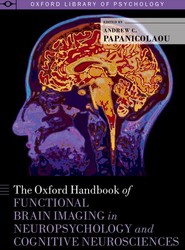(To see other currencies, click on price)
MORE ABOUT THIS BOOK
Main description:
What is immediately clear when meeting individuals with acquired brain damage is that the patterns of communication impairments vary in remarkable ways among these individuals. Aphasia and related communication disorders, while devastating life events for individuals who acquire brain damage, provide lessons of considerable interest to many clinicians and researchers trying to understand the brain's neurological and psychological complexity and develop methods to
facilitate optimum recovery of lost language and communication functions following brain damage. The Oxford Handbook of Aphasia and Language Disorders weaves theoretical and neurological foundations with rational, motivated clinical approaches to assessment, diagnosis, and intervention for aphasia and
related communication disorders. The contributing authors, experienced clinicians and scientists with strong backgrounds in neurological and cognitive neuropsychological theories, bridge theory to clinical practice, reviewing the extant literature in each aphasia syndrome while exploring implications for guiding clinical decision-making.
Introductory chapters provide historical perspectives on the aphasia syndromes following left hemisphere brain damage, and review aphasia assessment across the decades. The bulk of the Handbook covers aphasia syndromes, with chapters that describe each aphasia syndrome in detail, including behavioral, neural, and cognitive neuropsychological correlates and methods to assess and treat each syndrome. Additional chapters provide insights into acquired reading and writing disorders and social and
prosodic communication disorders that follow damage to the right cerebral hemisphere. The final chapters examine neural perspectives on aphasia recovery and principles of neuroplasticity in aphasia treatment. As such, this book integrates neural, cognitive, and clinical perspectives to provide a
broad understanding of the complexity of language and impairments that can arise following acquired brain damage, and will be of interest to scholars and clinicians in the speech-language, neuropsychology, and rehabilitation professions.
Contents:
About the Editors
Contributors
Part One: Introduction
1: Aphasia Syndromes: Introduction and Value in Clinical Practice
Anastasia M. Raymer and Leslie J. Gonzalez Rothi
2: Aphasia Syndromes and Information Processing Models: A Historical Perspective
Kenneth M. Heilman
3: Aphasia Assessment
Janet P. Patterson
Part Two: Aphasia Syndromes
4: Wernicke's Aphasia: Auditory Processing and Comprehension
Margaret L. Greenwald
5: Conduction Aphasia: Impaired Phonological Processing
Carolyn E. Wilshire
6: Semantic Processing in Transcortical Sensory Aphasia
Jamie Reilly and Nadine Martin
7: Anomia and Anomic Aphasia: Implications for Lexical Processing
Stacy M. Harnish
8: Broca's Aphasia and Grammatical Processing
Lynn M. Maher
9: Global Aphasia
Elizabeth E. Galletta and A. M. Barrett
10: Transcortical Motor Aphasia
Bruce A. Crosson, Anastasia Ford, and Anastasia M. Raymer
11: Mixed Transcortical Aphasia: Repetition without Meaning
Annette Baumgartner
12: Acquired Alexias: Mechanisms of Reading
Ellyn A. Reilly, Elizabeth Brookshire, and Diane L. Kendall
13: Acquired Dysgraphias: Mechanisms of Writing
Pelagie Beeson and Kindle Rising
Part Three: Language and Right Hemisphere Damage
14: Discourse and Social Cognition Disorders Affecting Communication Abilities
Maximiliano A. Wilson, Bernadette Ska, and Yves Joanette
15: Right Hemisphere Damage and Prosody
Susan A. Leon, Amy D. Rodriguez, John C. Rosenbek
Part Four: Clinical Implications
16: Biological Markers of Aphasia Recovery after Stroke
Marcus Meinzer, Lena Ulm, and Robert Lindenberg
17: Principles of Aphasia Rehabilitation
Anastasia M. Raymer and Leslie J. Gonzalez Rothi
Index
PRODUCT DETAILS
Publisher: Oxford University Press (Oxford University Press Inc)
Publication date: January, 2018
Pages: 328
Dimensions: 178.00 x 260.00 x 26.00
Weight: 804g
Availability: Available
Subcategories: Counselling & Therapy, Neurology
From the same series
Thomas H. Ollendick
Robert F. Krueger
Michaela A. Swales
Pascal Belin
Shaun Gallagher
Kieran C.R. Fox
W. Stewart Agras
Shane J. Lopez
Maryanne L. Fisher
Jane Edwards
Seth J. Schwartz
Stephen G. Harkins
Andrew C. Papanicolaou
Robert J. DeRubeis
Thomas A. Widiger
Michael Waldmann
Matthew K. Nock
Stephen M. Kosslyn
Stephen M. Kosslyn
Phillip M. Kleespies
Kenneth J. Sher
Kieran T. Sullivan
Kenneth J. Sher
Kenneth J. Sher
Amy Wenzel
Thomas J. Dishion
Jane Edwards
Marc Marschark
Arthur M. Nezu
Robert Turner
Jeffrey Jensen Arnett
Stephen P. Hinshaw
Turhan Canli
Ken Laidlaw
Ying-yi Hong
Michael W. O'Hara
Nichola Rumsey
Matthew K. Nock
David H. Barlow
Susan David
Gail Steketee
Howard S. Friedman
Julie Simner
Lisa J. Miller
Thomas Widiger
Michael L. Wehmeyer
Simon Liversedge
Jonathan S. Comer
Jeffry A. Simpson
Marjorie Taylor
Donald H. Saklofske
William Ming Liu
Judy Illes
Elizabeth Vera
Susan D. Clayton
Thomas Widiger
Lisa J. Miller
Paul Kennedy
Suzanne Segerstrom
Edmund O. Acevedo
Valerie Maholmes, Ph.D., CAS
J. Gayle Beck
Richard M. Ryan
Charles M. Morin
Janice H. Laurence
Michael Nash
Elizabeth M. Altmaier
Shane J. Lopez
Jacob A. Burack
Jon E Grant
Robert K. Conyne
Simon Liversedge
Judy Illes
Peter E. Nathan
David H. Barlow
Susan Folkman
W. Stewart Agras
Christopher Plack
Paul Fuchs
James N Butcher
Martin M. Antony
Ulf Ziemann































































































